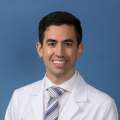In 2007, 12-year-old Cody Allarte was diagnosed with . His pediatrician explained that CF is a condition that changes protein in the body, affecting the body’s cells, tissues, and glands that make mucus and sweat. It causes mucus to become thick and when it builds up, can result in blockages, damage, or infections in the organs.
The doctor also told him that CF would hurt his chances of having children later in life.
But like any kid around Allarte’s age at the time, the idea of infertility wasn’t exactly top of mind.
Fast-forward to adulthood. Now 30, Allarte is married and he and his husband regularly discuss having children. But that infertility diagnosis as an adolescent, along with new symptoms Allarte started experiencing in 2020, has made that a challenge.
“At first, it felt similar to testicular cancer,” Allarte said of the symptoms. “I started noticing lumps or (what felt like) a mass. Then, I started to have a lot of pain.”
Allarte began researching and consulting urological experts. He faced one roadblock after another — that is, until he met , a UCLA Health urologist specializing in male infertility.
“I was determined to find a urologist that has a background in patients with cystic fibrosis,” Allarte said. “That is where I found UCLA.”
Men diagnosed with CF often experience infertility due to a condition called congenital bilateral absence of the vas deferens (CBAVD), which is the absence of the sperm canal. The condition affects 97% to 98% of men with CF, preventing sperm from entering the semen and making it impossible for the sperm to reach and fertilize an egg.
After a year of consulting urological experts, Allarte finally saw a light at the end of the tunnel. His fertility concerns would be addressed, and his pain would finally be gone.
Two-in-one approach
“We went in and did a testicular biopsy to get a determination of the quality of sperm,” Allarte said. “Then, Dr. Andino did a sperm extraction. We also ended up doing an epididymectomy and varicocelectomy to take care of all the symptoms.”
A varicocelectomy is a surgical procedure to remove enlarged veins (varicoceles) in the scrotum, which are associated with infertility by impacting sperm production and reducing sperm quality. Varicoceles occur in about one in six men and are more common in men having issues with fertility, with up to 40% of men in fertility clinics being diagnosed with varicoceles.
An epididymectomy is a surgical procedure that involves removing the epididymis, a coiled tube at the back of the testicle responsible for storing and transporting sperm which was becoming painful due to blockage preventing sperm from leaving the body. This procedure was used to address the pain and discomfort Allarte was experiencing.

Dr. Andino performed both procedures at the same time along with sperm extraction and freezing to optimize his options for future fertility.
When Dr. Andino heard Allarte’s case, he said, he recalled how common it is for patients with CF to be predisposed to fertility challenges, although research and discussion around the fertility and quality of life impacts is limited. Still, he knew this was a case he could help solve while prioritizing fertility outcomes.
“We can take a two-in-one approach,” Dr. Andino said. “We extract sperm from the testicle and freeze it for future fertility use while simultaneously performing surgery to remove only the epididymis. The testicle and its ability to produce testosterone remain intact, but this approach allows us to relieve chronic pain that was located on the epididymis due to the congenital absence of the vas. Thankfully, we were able to do just that for Cody.”
Plans for a family
Since undergoing the procedure nearly a year ago, Allarte said, he is pain-free and now has the option to start a family — something many had told him would be impossible.
“Both my husband and I each want to have a biological child via surrogate,” Allarte said. “We’re pretty excited.”
What once seemed impossible is now within reach, leaving Allarte reflecting on the importance of having the courage to dig for answers and actively participate in one’s health care — especially when something feels off.
“I hope that people have the courage to speak up,” he said. “Ultimately, you are putting your life in their hands.”




